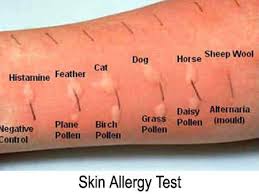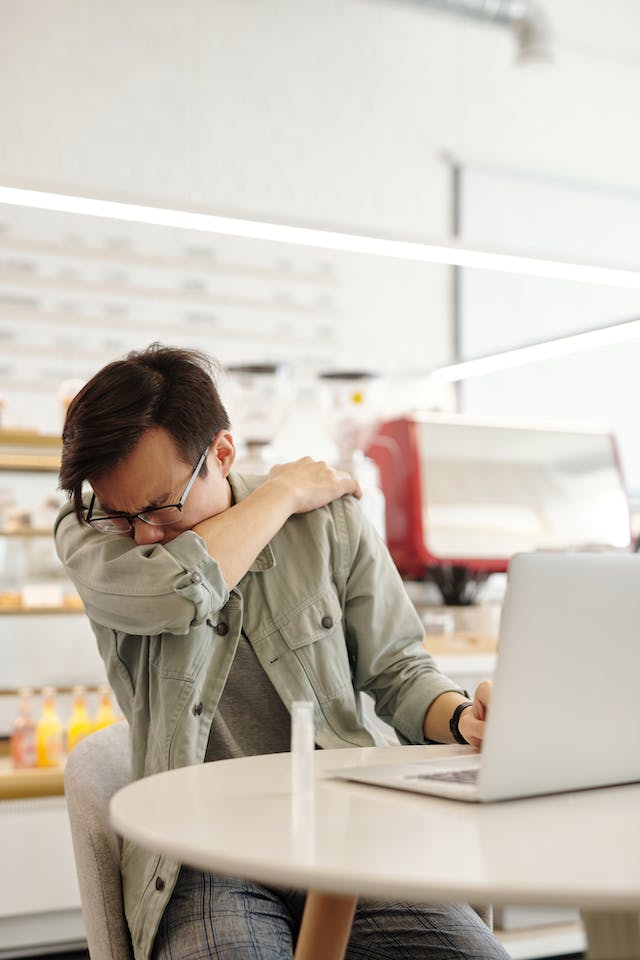Monthly Archives: October 2023
Allergy Testing 101: What to Expect at NYC’s Premier Allergy Clinic
 Are you experiencing mysterious symptoms that might be related to allergies? Perhaps you’ve been struggling with sneezing, itchy eyes, or unexplained skin rashes. If so, it’s time to consider allergy testing, a critical step toward identifying and managing your allergies. Dr. Boyan Hadjiev, MD, also known as “Dr. Sneeze,” operates NYC’s premier allergy clinic, Allergy, Asthma and Sinusitis P.C. In this blog post, we’ll explore what to expect when you undergo allergy testing at this clinic.
Are you experiencing mysterious symptoms that might be related to allergies? Perhaps you’ve been struggling with sneezing, itchy eyes, or unexplained skin rashes. If so, it’s time to consider allergy testing, a critical step toward identifying and managing your allergies. Dr. Boyan Hadjiev, MD, also known as “Dr. Sneeze,” operates NYC’s premier allergy clinic, Allergy, Asthma and Sinusitis P.C. In this blog post, we’ll explore what to expect when you undergo allergy testing at this clinic.
Allergy Testing 101: Why Allergy Testing?
Allergy testing is a vital diagnostic tool that helps pinpoint the specific allergens triggering your symptoms. Identifying these culprits is the first step toward effective allergy management. Dr. Sneeze and his team utilize cutting-edge allergy testing methods to provide you with accurate results and personalized treatment plans.
Allergy Testing 101: The Allergy Testing Process
1. Consultation and Assessment
Your journey begins with a comprehensive consultation with Dr. Sneeze or one of his skilled healthcare professionals. During this initial assessment, you’ll discuss your medical history, symptoms, and any potential triggers. This information helps guide the testing process and ensures a tailored approach to your care.
2. Skin Prick Testing
Skin prick testing is one of the most common methods used for allergy testing. It involves applying a small amount of allergen extracts to your skin, typically on your forearm or back. These extracts represent common allergens like pollen, dust mites, pet dander, and certain foods. Dr. Sneeze will then use a small, painless needle to prick or scratch the skin’s surface, allowing the allergens to enter.
3. Observation
After the allergens are introduced to your skin, you’ll be closely monitored for any allergic reactions. This typically involves checking for the development of small raised bumps, known as wheals, and assessing their size and severity. The presence and size of these wheals indicate your body’s response to specific allergens.
4. Interpretation and Diagnosis
Dr. Sneeze will carefully interpret the results of your skin prick testing. Positive reactions to specific allergens will help identify the substances to which you are allergic. This information is invaluable for creating a personalized allergy management plan.
What to Expect During Testing
- The entire process is relatively quick and typically takes around 20-30 minutes.
- Skin prick testing is minimally invasive and generally painless.
- You may experience mild itching or redness at the test sites, but these symptoms are temporary and typically subside within a short time.
Preparing for Allergy Testing
Before undergoing allergy testing, there are a few essential steps to follow:
- Inform Dr. Sneeze of any medications you are taking, as some medications may interfere with the results.
- Avoid antihistamines for several days before testing, as they can suppress allergic reactions and affect the accuracy of the results.
Contact NYC’s Premier Allergy Clinic
Are you ready to take control of your allergies and find relief from your symptoms? Contact NYC’s premier allergy clinic, Allergy, Asthma and Sinusitis P.C.
Allergy, Asthma and Sinusitis P.C
Boyan Hadjiev, MD
30 East 40th Street
Suite 1200
New York, NY 10016
212-319-5282
Experience the highest standard of care and expert allergy testing to identify and manage your allergies effectively. Dr. Sneeze and his dedicated team are committed to helping you lead a healthier, symptom-free life. Contact them today and take the first step toward allergy relief.
Understanding Food Allergies: Tips from a Top Food Allergist in NYC
 Should you consult a food allergist? Food allergies can be a serious and life-altering condition, affecting millions of people in the United States. In a bustling metropolis like New York City, where dining out and culinary experiences are an integral part of life, understanding and managing food allergies becomes even more crucial. That’s where Dr. Boyan Hadjiev, a top food allergist in NYC, comes in. Known as “Dr. Sneeze,” he specializes in helping individuals navigate the complex world of food allergies and lead healthier lives. In this blog post, we will explore the key aspects of food allergies and share valuable tips from Dr. Sneeze to help you or your loved ones better manage this condition.
Should you consult a food allergist? Food allergies can be a serious and life-altering condition, affecting millions of people in the United States. In a bustling metropolis like New York City, where dining out and culinary experiences are an integral part of life, understanding and managing food allergies becomes even more crucial. That’s where Dr. Boyan Hadjiev, a top food allergist in NYC, comes in. Known as “Dr. Sneeze,” he specializes in helping individuals navigate the complex world of food allergies and lead healthier lives. In this blog post, we will explore the key aspects of food allergies and share valuable tips from Dr. Sneeze to help you or your loved ones better manage this condition.
What Are Food Allergies?
Food allergies are immune system reactions triggered by specific proteins in certain foods. When someone with a food allergy consumes the allergen, their immune system mistakenly identifies it as harmful and releases chemicals, such as histamines, to protect the body. This immune response can lead to a range of symptoms, from mild to severe, including:
- Hives or skin rash
- Swelling of the face, lips, tongue, or throat
- Difficulty breathing
- Abdominal pain
- Nausea and vomiting
- Diarrhea
- Anaphylaxis, a severe and potentially life-threatening reaction that can cause a drop in blood pressure and loss of consciousness
Common Food Allergens
While any food can potentially cause an allergic reaction, eight major allergens are responsible for the majority of food allergy cases. These include:
- Milk
- Eggs
- Peanuts
- Tree nuts
- Soy
- Wheat
- Fish
- Shellfish
Diagnosing Food Allergies
Accurate diagnosis of food allergies is essential for effective management. Dr. Sneeze offers comprehensive allergy testing, including skin prick tests and blood tests, to identify specific allergens triggering your symptoms. If you suspect a food allergy, seek professional medical advice rather than attempting self-diagnosis.
Understanding Food Labels
Reading food labels is a crucial skill for anyone with food allergies. Dr. Sneeze advises his patients to:
- Carefully read ingredient lists for potential allergens.
- Be aware of hidden sources of allergens, such as cross-contamination in shared kitchen equipment.
- Understand labeling terms like “may contain,” “processed in a facility that also processes,” and “contains.”
Creating a Safe Eating Environment
Dr. Sneeze recommends the following steps to create a safe eating environment when you have food allergies:
- Inform Others: Educate your friends, family, and dining companions about your food allergies. They should be aware of the seriousness of the condition and how to respond in case of an allergic reaction.
- Carry Medications: Always carry prescribed epinephrine auto-injectors (e.g., EpiPen) and antihistamines. These can be lifesaving in case of an allergic reaction.
- Communication is Key: When dining out, communicate your allergies to restaurant staff, including chefs and servers. Ask questions about ingredients, food preparation methods, and potential cross-contamination risks.
- Plan Ahead: Plan your meals and snacks carefully to ensure you have safe options readily available. This includes packing safe snacks when traveling or attending events.
Food Allergist: Seeking Professional Guidance
Managing food allergies can be challenging, but with the right guidance, it becomes much more manageable. Dr. Sneeze and his team specialize in helping individuals develop personalized strategies for coping with food allergies. They can provide:
- Allergy testing to identify specific allergens
- Guidance on allergen avoidance
- Emergency action plans for severe reactions
- Education on reading food labels
- Immunotherapy for potential desensitization
Contact NYC’s Leading Food Allergist: Dr. Boyan Hadjiev
Don’t let food allergies limit your enjoyment of life in the Big Apple. Dr. Boyan Hadjiev, known as “Dr. Sneeze,” is here to help you understand and manage food allergies effectively. Dr. Sneeze is NYC’s leading allergist, providing expert care and guidance for individuals with food allergies.
To schedule an appointment or seek assistance, contact Dr. Sneeze today:
Dr. Boyan Hadjiev
Allergy, Asthma and Sinusitis P.C.
30 East 40th Street, Suite 1200
New York, NY 10016
Call 212-319-5282 or visit https://drsneeze.com for more information.
Take control of your food allergies and enjoy a safer, healthier life!
Serving all of New York City and the Tri State Area including Zip Codes: Top Allergist NYC Midtown, Chelsea and Clinton: 10001, 10011, 10018, 10019, 10020, 10036 | Gramercy Park and Murray Hill: 10010, 10016, 10017, 10022 | Greenwich Village and Soho: 10012, 10013, 10014 | Lower Manhattan: 10004, 10005, 10006, 10007, 10038, 10280 | Lower East Side: 10002, 10003, 10009 | Upper East Side: 10021, 10028, 10044, 10128 | Upper West Side: 10023, 10024, 10025
